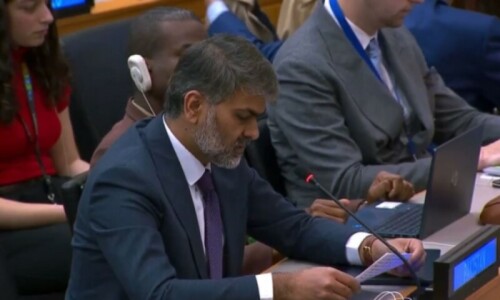PERHAPS one can understand why the officers of the FBR have been so taken aback by the news that the government is planning deep-rooted reform at the institution, but it is difficult to empathise with their reaction. The prime minister had announced in his first public address that FBR reform was on top of his list of priorities, and the appointment of Shabbar Zaidi from the private sector was the second indication that tax policy and administration were both in the spotlight for the PTI government. It should not come as such a big surprise that sweeping reform of the sort that changes the very architecture of the institution is now being discussed at the highest levels of policymaking. Besides, it is the right of the government to undertake such reform, and whether or not it is obligated to consult the staffers of the organisation concerned while deliberating on the planned changes is open to question.
The FBR officers are demanding a say in drafting the plan. This is a way of communicating that only the reforms they agree to would be acceptable to them, which, in turn, is tantamount to denying the government its mandate to make and implement policy decisions. FBR officers are notorious for resisting change. They thwarted the reforms envisioned in the Shahid Hussain report of the early 2000s, as well as those associated with the sales tax act of 2010. Left to their own devices, nothing will ever change, and revenue leakages and inefficiencies will continue to plague the country. Perhaps it can be argued that the government can manage the process of reforms better to obtain buy-in from those most impacted by them, but this does not mean that the officers’ association can be allowed to wield a veto over reform decisions. The FBR is by now notorious for alleged corruption and racketeering, and ending these, along with the attendant revenue leakages, is a top priority for the government. If the officers are so concerned about playing a role for the betterment of the country, as their public pronouncements seem to suggest, perhaps they should be more vigilant and discourage the culture of corruption that has taken root among their subordinates. They should provide wholehearted support to automating the board’s functions and minimising contact between the taxpayer and tax collector. That will add credibility to their grievances.
Published in Dawn, November 8th, 2019












































